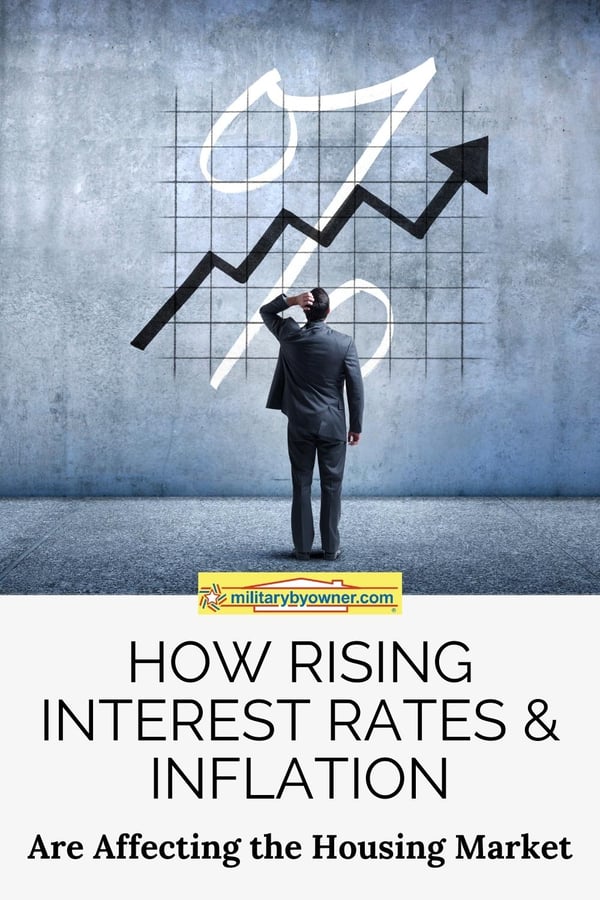How Interest Rates Affect the Housing Market
In this post:
- Mortgage Rates Are Rising, But Why?
- How Are Mortgage Interest Rates Determined?
- How Rising Interest Rates Affect Sellers
- How Rising Interest Rates Affect Buyers
- Will Higher Interest Rates Lower Housing Prices?
- Should Military Families Buy or Sell a Home Right Now?
It’s no secret that the current housing market has been breaking records across multiple fronts. Beginning in 2020, housing markets and buyers witnessed historically low mortgage interest rates. Yet in just a few short months, home price appreciation shot up to double-digit increases throughout the country, with bidding wars becoming all but common place. Home prices aren’t the only thing skyrocketing; the effects of inflation are felt in every sector, from groceries to gasoline.
In this market, military families may be asking questions like, does buying a home still make sense? What does the current market mean for those looking to sell in the not too distant future? Are there strategies to help your family make the best decision?
Let’s take a closer look at what’s happening in the market and what effects to consider as a military family, whether you’re looking to buy or sell.

Mortgage Rates Are Rising, But Why?
At first, the initial effects of the COVID-19 pandemic ground world economies to a near halt in early 2020. Unemployment rates spiked month over month, as businesses shuttered.
Initially, mortgage rates dropped in response to a stagnant economy. Getting into a home was suddenly more affordable than it had been in years, for buyers who could qualify for a loan. However, across the country, low housing inventory had been a growing problem prior to the pandemic. The combination of low inventory with more affordable lending created a rising demand that eventually resulted in one of the hottest seller’s markets in over a decade. Both buyers and sellers began to experience bidding wars.
The market signal to buyers was clear: the time to buy is now, while you still could! For sellers witnessing rising home appraisals, and multiple-buyers, it was time to cash out and get top-dollar in a hot market.
But, as buyer demand continued to outstrip the supply of available homes across the nation, housing prices began to skyrocket.
And as the world slowly began to shake off the economic stagnation inflicted from the pandemic, consumer demand across the globe began to increase. Sharply increased consumer demand led to supply-chain bottlenecks, contributing to inflation. By March of 2022, the inflation rate spiked to 8.5%, a 40-year high at levels not seen since the 1980s, as reported by the U.S. Department of Labor.
The inflationary effect in real estate materialized as rising home prices, appreciation, and steadily increasing mortgage interest rates.

Image from Canva
How Are Mortgage Interest Rates Determined?
While mortgage interest rates are affected by personal factors. such as credit score and history, your debt to income and Loan to Value (LTV) ratios, there are also a number of market factors outside of personal control that influence rates.
Unemployment Rates and Job Growth
Mortgage rates tend to fall during hard times when economic markets slow and stagnate. In more prosperous times when jobs are plentiful, mortgage rates subsequently rise.
Overall Economy
During a slow economy, mortgage rates are lower, in an attempt to spur consumer spending. But during periods of booming economic growth, inflation tends to rise, with mortgage rates closely following.
The Federal Reserve
The Federal Reserve does not set mortgage rates, but it does set short-term interest rates as one of the basis costs of borrowing money and strongly influences the real estate market. In response to economic forces, such as spiking inflation, short-term interest rates are raised, which do tend to result in higher mortgage interest rates.
Other Economic Factors
Investor activity within the bond and stock market directly affects the overall economy, which will be felt in real estate. The bond market provides a significant source of funding for residential mortgages. In prosperous times, investors tend to shift their money into the stock market for higher yields, as bond yields are typically lower. But in an inflationary market, it doesn’t make sense to buy a bond with a 5% return, when inflation is say, 6-8% (such as mid-2022). Less overall money in the bond market is a smaller funding source for residential mortgages, thus mortgage rates tend to rise.
Understanding what factors are driving changes in mortgage rates, can help you understand how these market changes will affect you as both, a seller or a homebuyer.
How Rising Interest Rates Affect Sellers
Rising mortgage rates will directly affect buyer affordability, which will have ripple effects for sellers. As a result, some buyers will be priced out of markets. For instance, instead of a $400,000 limit with a 4% mortgage interest rate, the new ceiling with a 6% interest rate may place buyers in the $350,000 to $375,000 range.
A Final Spike
Predicting the future is tough, but there may likely be a final spike in home purchases before an eventual cooling down. In May, recent news outlets reported the Federal Reserve announced its sharpest interest raise in over 20 years, with more raises expected for 2022. Buyers may react to the recent interest rate spike and attempt to buy while they still can, but eventually that spike may level off or dip, and sellers may began to experience longer times on the market.
Bidding Wars May Cool
Rising interest rates will likely drive some homebuyers from the market or cause existing buyers to adopt a wait and see approach. The end result either way for sellers? It is a reasonable likelihood that soon, there will likely be a reduced number of buyers in the market.
Below the Median
Median home price varies by region and can often vary by month, sharply increasing during the recent white-hot sellers’ market. But sellers with homes below the current median rate in a respective area may see a new influx of buyers, as buyers may be reevaluating their affordability ceiling in a home purchase and begin looking for homes below the geographic area’s median price range.
 Image from Canva
Image from Canva
How Rising Interest Rates Affect Buyers
Buyers will likely see reduced purchasing power, as higher mortgage interest rates means more of the monthly mortgage payment will be used to cover the cost of the loan. Mortgage interest rates have risen nearly two percent in the past year. A 1% change in interest rates equates to approximately $200 dollars.
For example, assuming a $350,000 home with a 0% down payment, available with the VA Loan:
- 4% mortgage interest rate: $1,970/monthly mortgage
- 5% mortgage interest rate: $2,175/monthly mortgage
- 6% mortgage interest rate: $2,395/monthly mortgage
For buyers, rising rates may drive a new financial picture in evaluating how much home you can afford, particularly in higher loan to value (LTV) scenarios with a limited down payment.
Pre-Qualify and Rate Lock Early
For now, the days of 3-4% mortgage rates are over, and rates will likely continue to rise throughout 2022, as the Federal Reserve has signaled they expect to raise short-term rates. Before you go house hunting, pre-qualify with a lender to determine your budget, how much home you can afford, and to get an estimate on what your monthly mortgage will be. Buyers who are able to get a home under contract would benefit from locking their interest rate as soon as possible in the underwriting process, as rates could very well rise before closing the sale.
Will Higher Interest Rates Lower Housing Prices?
It is unlikely there will be a bear-market drop in housing prices to the effect experienced in the 2008-2009 timeframe. With inflation stubbornly high, it is quite possible for home prices to reflect overall economic dynamics and also remain high.
In real estate markets, a retraction in the number of available buyers and the price point they can afford tends to reduce demand, which usually tips the scales from a seller’s market, eventually, to a buyer’s market. However, with broader economic inflation continuing to rise, it is unlikely to see housing prices drop anytime soon.
 Image from Canva
Image from Canva
Should Military Families Buy or Sell a Home Right Now?
The recent housing market has been particularly challenging for military families, who often have little choice when they must move. The ever-present challenge remains, whether it is smarter to rent or buy, and determining the right answer for your family’s needs can be a challenge.
But talking through a few key questions for your family’s situation will help determine the best fit for your family’s needs and goals.
Is this a forever home or in a highly desired locale? As a buyer, home inventories will remain tight for some time and it may make sense to buy now (even with a higher rate) if you’ve received orders to your dream retirement location. As a seller, do you intend to return to the area, either as a retirement destination or a likely career return, such as in the Washington, D.C., metro area?
Renting, or buying: will you need to come out of pocket over BAH? BAH rates are not keeping up with inflationary demand for either renters and buyers, and as a result, some families are paying hundreds of dollars over BAH to snag a rental. Buyers face a similar challenge if they discover their mortgage payment will be over BAH. Will that be sustainable for your family?
Evaluate the Rent-to-Buy Window. If Average Market Rent is higher than an Average Mortgage, then buying is favorable. It actually might be cheaper to buy a home versus rent. However, if the inverse is true and an average mortgage will be higher than rent for a comparable space, it likely doesn’t make the best financial sense for a military family to buy in that market. This scenario offers the least flexibility for a military family and could result in a financial loss in a tough market if homes aren’t selling quickly and market rents aren’t enough to cover your mortgage. (See Buy or Rent a Home? 5 Solid Strategies for Military Families Making the Decision.)
What will your Loan to Value (LTV) margin be? A low or zero down payment is certainly a welcome benefit to help homebuyers get into homes—but there is a risk with having too little equity in the home. If the market restricts and home prices dip, buyers with a very tight LTV could find themselves “upside-down” in a mortgage, meaning they’ve taken out a loan for more than the home would currently sell for.
Are you prepared to be a landlord if the market dips or you need to hold onto the home? Being a landlord can be tough, and while it can offer a prime future wealth and investment opportunity, it is not the right answer for everyone.
While we at MilitaryByOwner unfortunately do not have a crystal ball (wouldn’t that be nice!), we do have a wealth of expertise to assist you along your home buying and selling journey and with your real estate needs.
Don’t miss our complete series of ebooks for more lists and help. And if you're looking to buy a home, start out with our free resource below!

.jpg)



